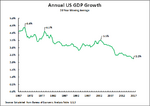Isn't there an argument to be made about slowing growth though? Like, it might not be your field, but chances are you've heard of the idea of degrowth, decoupling/green growth, and steady state economies? Even if MEDCs are operating under growth of 1%, the level of resource use is arguably already at unsustainable levels.
I'm as aware of these as anyone who pays good attention to current affairs. Which is to say, I have some superficial knowledge of them.
I don't think they are going to happen without a paradigm shift. I would defend this by reaching back to history. The great economist John Maynard Keynes in the 1930s believed that the massive expansion in productivity and personal wealth would allow us to lead vastly shorter working lives (like, a 16-hour working week) and free to enjoy leisure and personal development and satisfaction instead. So how did that work out?
Well, to be fair, average working hours have decreased somewhat, but nothing like what he dreamt of. I would put that down to maybe three main factors:
1) International competition and realipolitik. All countries want to stay ahead of the others. A country that decides to let its citizens enjoy leisure ahead of work would quickly become weaker and vulernable in the shark pool of nationalism and global politics.
2) Capitalists. Imagine you're a businessman who gets a thrill for making shitloads of money, which contributes to your ego, influence, power. You take a chunk of what the peons produce. Are you going to accept the proles doing less, so making you less? I don't think so. And you've got a lot money to convince people to your view.
3) Individuals. Individuals too measure themselves against each other or want more, they want that bigger house and that bigger car and that better mobile phone, so they need to earn more, and in cases of scarcity more than the next guy. They might have much more modest ambitions than the capitalist in (2), but there are a lot of them.
And in brief, all those factors 1, 2 & 3 still exist as much now as ever. If the USA is in a global ideological and power conflict with China, can either take their foot off the pedal? Quick answer, no. People want their cars, their four cars per household. Businessmen as are driven by amassing wealth as ever even as they choke their countrymen on fumes and drown their houses under rising seas, just like they used to pack seven-year-old kids into factories to lose limbs to whirling machinery.
Like every other animal on the planet, I think more likely ultimately we will expand to critical failure of sustainability and have to endure the resultant crash. Maybe we'll manage to get it together and hold a plateau - the climate stuff has made me so pessimistic on this score. I think our sense of individualism is potentially a major problem here, because the cats will not suffer being herded. Had we more compassionate, communitarian and even possibly authoritarian societies as dominant paradigms we might have a better chance at enforcing a course correction.

 www.vice.com
www.vice.com


